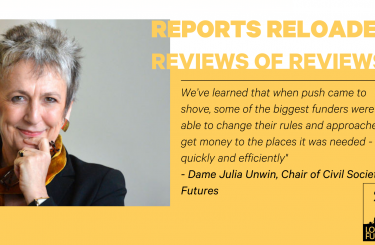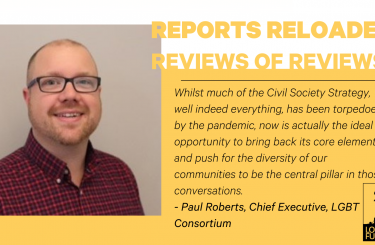Related


Launched in April 2016, The Way Ahead report proposed a new vision and system for civil society and how it should be supported in the future. A co-produced publication, the report identified and explained 12 core recommendations for stakeholders from across London’s civil society to take forward to ensure that infrastructure in London not only survives but thrives.
Sharon Long, Strategic Director at Partnership for Young London reflects on the original publication and how the structures recommended for civil society working together provided a basis for civil society’s response to the pandemic.
The last two years have been complex, challenging, and overwhelming across London, for the communities we work with, our staff and volunteers, our friends and families. Strangely the crisis has also highlighted how we can collaborate, collectively pool resources, be creative, adaptive, and resilient. Civil society had and continues to have a vital role to play in dealing with the pandemic. Mutual Aid groups stepped in to help local communities, youth workers ran detached services to help young people, volunteer networks got critical support out to shielding groups, faith and belief groups supported bereaved families, specialist equalities groups provided targeted services to those disproportionately affected by COVID19 and food banks supported communities across the region.
At the outset of the pandemic, the Covid Strategic Co-ordination Group was established as part of London’s emergency response. A strategic group working on a range of priorities from hospital beds to social care, COVID guidance, and vaccine roll to name but a few. For many of us, this was a steep learning curve, building on the learning from previous emergency incidences, bringing together all partners to plan the response and the recovery processes. Across these structures, it was vital to make sure that civil society was embedded in the emergency response from the outset, and a working group called the FCVS (Funders, Community, Voluntary Sector, and Faith) Group was established. This was a network of people committing their time and resources throughout the pandemic, together with data and insights on the needs of different communities, communicating the guidance out to their networks, feeding back community concerns to strategic partners, identifying gaps in services, and pooling resources to provide emergency funding to those most in need.
The group met regularly and although the nature, urgency, and shape of the work may have changed and developed over the last 18 months, the cross-sector collaboration remained. How does any of this relate to the work of the Way Ahead? From my perspective, that work, and the structures created around it helped to set some of the foundations of how we collectively stepped up during the pandemic. It created a coalition of people and organisations who believed in systems change, who worked across organisational boundaries trying to make sure that civil society was firmly at the core of London both in policy and practice and it built trust across organisations. From this baseline, people came together quickly to respond to the pandemic, pooling their resources, tackling issues quickly, and sharing insights to help influence and inform not only the pandemic response but also into recovery.
The Way Ahead and the structures created around it helped to set some of the foundations of how we collectively stepped up during the pandemic
Our learning across the last 18 months was immense. To be clear, it didn’t all work seamlessly, we had to change and adapt as the pandemic progressed, and its impact become more evident. It highlighted again the need to properly resource groups to engage with regional structures, it gave a stark illustration of how small groups were both stepping up, but also being overwhelmed with the demands from their communities, their staff, and volunteers were struggling with burnout and precarious funding. We struggled at times to distinguish between what is an emergency response and what needs to be the focus for the transition to recovery when many of the issues our communities faced were the result of ongoing and entrenched inequalities.
Our learning across the last 18 months was immense. To be clear, it didn’t all work seamlessly, we had to change and adapt as the pandemic progressed, and its impact become more evident.
And lastly, what has it told us? What next? Moving forward we need to build on this to ensure that civil society is at the core of regional structures in a more systematic way. The Way Ahead started that process, it may have at times felt cumbersome, but it’s created some foundations through which we can collaborate and work together across London. London has a recovery process in place and civil society and the needs of London’s communities need to be central to that work. It showed us how to be adaptive across our work and it pooled knowledge, skills, and insight. At many stages, it was mentioned that we cannot go back to business as usual with siloed working and how a systems-based approach was the only way forward. We need to keep reminding ourselves of that and challenge ourselves to think differently if we are to rise the challenge of recovery for Londoners.

